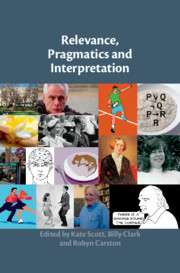Book contents
- Relevance, Pragmatics and Interpretation
- Relevance, Pragmatics and InterpretationEssays in Honour of Deirdre Wilson
- Copyright page
- Contents
- Contributors
- Cover Acknowledgements
- Introduction
- Reflections on the Development of Relevance Theory
- Part I Relevance Theory and Cognitive Communicative Issues
- Part II Pragmatics and Linguistic Issues
- 8 Mood and the Analysis of Imperative Sentences
- 9 The Korean Sentence-Final Suffix ci as a Metarepresentational Marker
- 10 Expressive Epithets and Expressive Small Clauses
- 11 Ad Hoc Concepts, Polysemy and the Lexicon
- 12 The Polysemy of a Norwegian Modal Adverb
- 13 Noun-Noun Compounds from the Perspective of Relevance Theory
- 14 Procedural Syntax
- Part III Figurative Language and Layered Interpretations
- References
- Author Index
- Subject Index
12 - The Polysemy of a Norwegian Modal Adverb
from Part II - Pragmatics and Linguistic Issues
Published online by Cambridge University Press: 08 July 2019
- Relevance, Pragmatics and Interpretation
- Relevance, Pragmatics and InterpretationEssays in Honour of Deirdre Wilson
- Copyright page
- Contents
- Contributors
- Cover Acknowledgements
- Introduction
- Reflections on the Development of Relevance Theory
- Part I Relevance Theory and Cognitive Communicative Issues
- Part II Pragmatics and Linguistic Issues
- 8 Mood and the Analysis of Imperative Sentences
- 9 The Korean Sentence-Final Suffix ci as a Metarepresentational Marker
- 10 Expressive Epithets and Expressive Small Clauses
- 11 Ad Hoc Concepts, Polysemy and the Lexicon
- 12 The Polysemy of a Norwegian Modal Adverb
- 13 Noun-Noun Compounds from the Perspective of Relevance Theory
- 14 Procedural Syntax
- Part III Figurative Language and Layered Interpretations
- References
- Author Index
- Subject Index
Summary
In this chapter, Thorstein Fretheim discusses a Norwegian modal adverb, gjerne, which he maintains is polysemous, in that it has two related meanings, both of which are conventionalised and stored in the lexicon. This case of polysemy seems to be different from the polysemy of open-class words (nouns, verbs, adjectives), which is typically explained in relevance-theoretic terms as involving pragmatic adjustments of an encoded concept. Fretheim argues that the two meanings of gjerne are better analysed as encoded procedures, so as constraining the hearer’s interpretation process rather than contributing a concept to that interpretation.
Keywords
- Type
- Chapter
- Information
- Relevance, Pragmatics and Interpretation , pp. 163 - 173Publisher: Cambridge University PressPrint publication year: 2019
- 2
- Cited by

